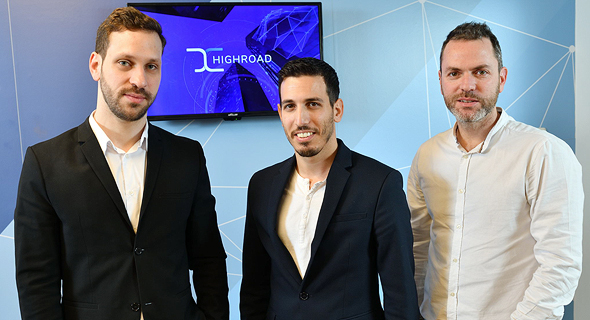"Covid-19 Highlighted the Need for Innovation in the Urban Space”
Four urban tech startups completed Highroad’s third cohort
“The importance of urban tech was amplified by the coronavirus (Covid-19) pandemic, both throughout the outbreak and when it comes to understanding the factors that caused it. The events of the last few months highlight and emphasize the challenges and requirements of innovation in the urban space, such as air quality control (in preventing the outbreak) or monitoring people’s movements in public spaces,” Eyal Hoffman, managing partner of Highroad, told Calcalist following an online event held by the accelerator on Tuesday.
 Highroad co-founders (from left) Eyal Hoffman, Eliran Binman and Guy Zaks. Photo: Israel Hadari
Highroad co-founders (from left) Eyal Hoffman, Eliran Binman and Guy Zaks. Photo: Israel Hadari The products developed by the four companies that completed the launchpad program all meet current market needs and offer solutions to problems that exist in urban spaces.
Co.ing is an online platform that helps create and manage thriving communities in the physical world. It provides community managers and members the ability to create and manage social, professional, and economic projects.
The people behind Castory developed a construction-tech app that detects and warns of building defects and deviations between visual data on the worksite and the project blueprints.
Artishok presented a comprehensive technological solution for workspace management that uses artificial intelligence and sensors to improve office spaces’ access, occupancy, and energy.
Livv developed a system based on artificial intelligence, machine learning, machine vision, and neuro-linguistic programming (NLP) that can substitute the real-estate agent by matching the tenants’ requirements with the existing rental inventory.
The startups that were selected for the launchpad program’s third cohort joined the ranks among the 10 graduates of the previous cohorts, who have earned investments adding up to millions of dollars and received close guidance by the Highroad team and a wide range of experts and mentors across various fields.
Highroad’s Launchpad program lasts six months and provides the chosen startups with initial funding, mentor guidance, advice from industry experts, access to the innovation center’s shared workspace and technological labs, and introductions to potential clients and strategic investors from all over the world.
Hoffman said that despite the Covid-19 crisis and the limitations on travel and meetings, the center has been in constant contact with the participating companies as well as the mentors, experts, and investors they facilitate. “The ties were even strengthened because virtual meetings are often easier to arrange than physical ones, especially with people in other countries. During the course of the program, we hold many seminars that were all moved online, allowing us to book lecturers that we’d have a harder time bringing in in person. So from that perspective, it was a clear benefit to our companies,” he said.
“The circumstances made us all realize we are close to one another, just like the guy in the building next door. Facilitating digital access to content, events, and business processes enable the participation of people from a wide variety of locations. Yesterday’s Highroad.show event for example was attended by investors and strategic clients from the U.S., Singapore, Japan, France, the U.K., Germany, Spain, Mexico and Argentina, who may not have taken part if it was only being held in physical space.”



